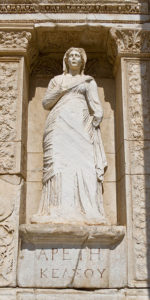
There is no healthy citizenship without areté
The construction of wisdom and virtue (the Greek arete) in the fight against doxa (mere opinion of the relative truth) and the sophists, who despite being wise were corrupted by the taste of power, passions and instincts, made Socrates, who we know him from Plato’s dialogues, and Plato himself to build a new model of citizenship that needed to educate, to leave the Cave for the light and to organize knowledge for the true Good.
(mere opinion of the relative truth) and the sophists, who despite being wise were corrupted by the taste of power, passions and instincts, made Socrates, who we know him from Plato’s dialogues, and Plato himself to build a new model of citizenship that needed to educate, to leave the Cave for the light and to organize knowledge for the true Good.
It is a fact that the sense of excellence was adopted by state authorities, but its etymological origin remains valid and to defend it is to defend the good, otherwise we fall into sophist relativism, any truth and any argument is valid, the Socratic maieutics is still valid and to ask is to dialogue.
Martha Nussbaum, one of the most renowned philosophers today in classical antiquity, pointed out in her book The Fragility of Goodness: “… indolence, error and ethical blindness cause countless tragedies”, are relevant aspects that Democrats must remember for the defense of democracy and the risk that modern sophists will seize power and manipulate opinions, these are not just fake news, mistaken and authoritarian positions, it is necessary to defend the values of true citizenship, areté (in picture sculpture in Ephesus).
We have already explained the biblical meaning of the net, the fishing and the casting of the nets, in another passage after returning from the Sea of Galilee Jesus and the disciples meet the crowd, and since the place is deserted, the apostles think of dismissing the crowd for lack of food, but Jesus says to see what was food and makes the well-known miracle of the multiplication of bread and fish, from 5 loaves and 2 fish.
It is clear that Christian virtue is beyond the proposal of the Greeks, it extends personal morality and the understanding of mercy, but it does not exclude the citizen arete and dominion of instincts and passions, nowadays so flourishing and reaching even the religious , poor reading of the multiplication of bread and fish that is more related to Christian arete than polis, as they were “in a deserted place” (Mt 14,15), that is, a kind of “retreat” of the polis.
The virtue of compassion is necessary for the distribution of goods, the process of concentration of wealth has accelerated with the pandemic, without collecting the few loaves and fish left of an economy in crisis to help thousands who are hungry, jobless and many without hope, this should be the real new normal if we want better days, only if there are better days for everyone without forgetting the millions who lost jobs, hope and family in this pandemic.









